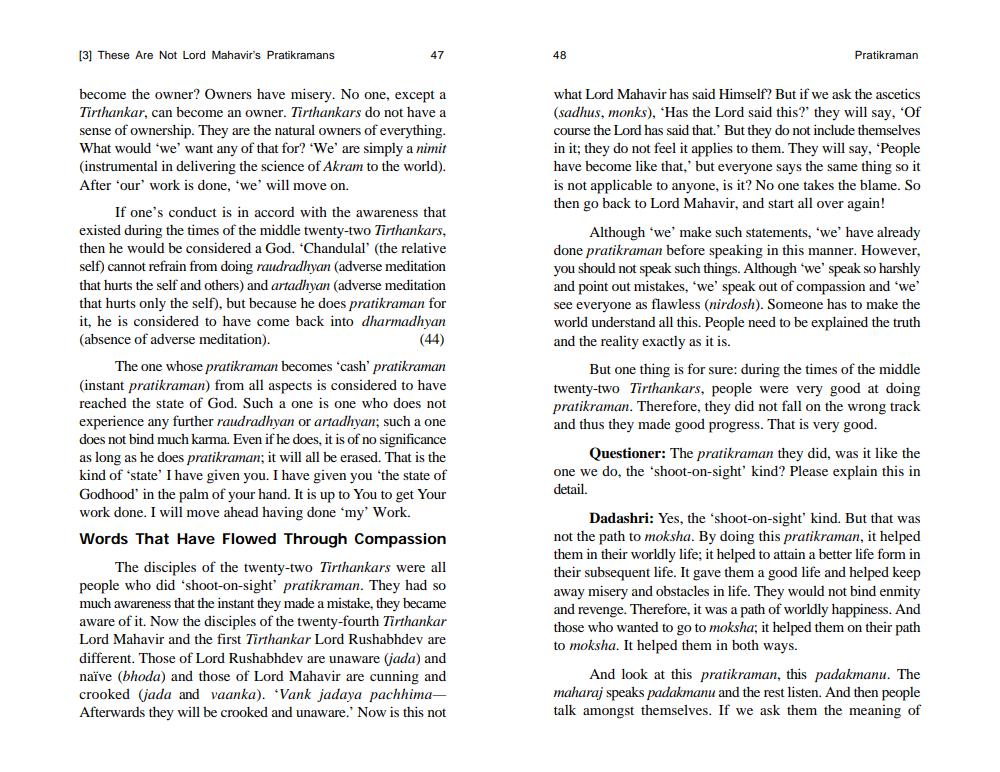________________
[3] These Are Not Lord Mahavir's Pratikramans
47
Pratikraman
become the owner? Owners have misery. No one, except a Tirthankar, can become an owner. Tirthankars do not have a sense of ownership. They are the natural owners of everything. What would 'we' want any of that for? 'We are simply a nimit (instrumental in delivering the science of Akram to the world). After 'our work is done, 'we' will move on.
what Lord Mahavir has said Himself? But if we ask the ascetics (sadhus, monks), 'Has the Lord said this?" they will say, 'Of course the Lord has said that.' But they do not include themselves in it; they do not feel it applies to them. They will say, "People have become like that, but everyone says the same thing so it is not applicable to anyone, is it? No one takes the blame. So then go back to Lord Mahavir, and start all over again!
If one's conduct is in accord with the awareness that existed during the times of the middle twenty-two Tirthankars, then he would be considered a God. 'Chandulal' (the relative self) cannot refrain from doing raudradhyan (adverse meditation that hurts the self and others) and artadhyan (adverse meditation that hurts only the self), but because he does pratikraman for it, he is considered to have come back into dharmadhyan (absence of adverse meditation).
(44) The one whose pratikraman becomes 'cash' pratikraman (instant pratikraman) from all aspects is considered to have reached the state of God. Such a one is one who does not experience any further raudradhyan or artadhyan; such a one does not bind much karma. Even if he does, it is of no significance as long as he does pratikraman; it will all be erased. That is the kind of 'state' I have given you. I have given you 'the state of Godhood' in the palm of your hand. It is up to you to get Your work done. I will move ahead having done 'my' Work. Words That Have Flowed Through Compassion
The disciples of the twenty-two Tirthankars were all people who did 'shoot-on-sight' pratikraman. They had so much awareness that the instant they made a mistake, they became aware of it. Now the disciples of the twenty-fourth Tirthankar Lord Mahavir and the first Tirthankar Lord Rushabhdev are different. Those of Lord Rushabhdev are unaware (jada) and naïve (bhoda) and those of Lord Mahavir are cunning and crooked (jada and vaanka). 'Vank jadaya pachhimaAfterwards they will be crooked and unaware.' Now is this not
Although we make such statements, 'we' have already done pratikraman before speaking in this manner. However, you should not speak such things. Although 'we' speak so harshly and point out mistakes, 'we' speak out of compassion and 'we" see everyone as flawless (nirdosh). Someone has to make the world understand all this. People need to be explained the truth and the reality exactly as it is.
But one thing is for sure: during the times of the middle twenty-two Tirthankars, people were very good at doing pratikraman. Therefore, they did not fall on the wrong track and thus they made good progress. That is very good.
Questioner: The pratikraman they did, was it like the one we do, the 'shoot-on-sight' kind? Please explain this in detail.
Dadashri: Yes, the 'shoot-on-sight' kind. But that was not the path to moksha. By doing this pratikraman, it helped them in their worldly life; it helped to attain a better life form in their subsequent life. It gave them a good life and helped keep away misery and obstacles in life. They would not bind enmity and revenge. Therefore, it was a path of worldly happiness. And those who wanted to go to moksha; it helped them on their path to moksha. It helped them in both ways.
And look at this pratikraman, this padakmanu. The maharaj speaks padakmanu and the rest listen. And then people talk amongst themselves. If we ask them the meaning of




